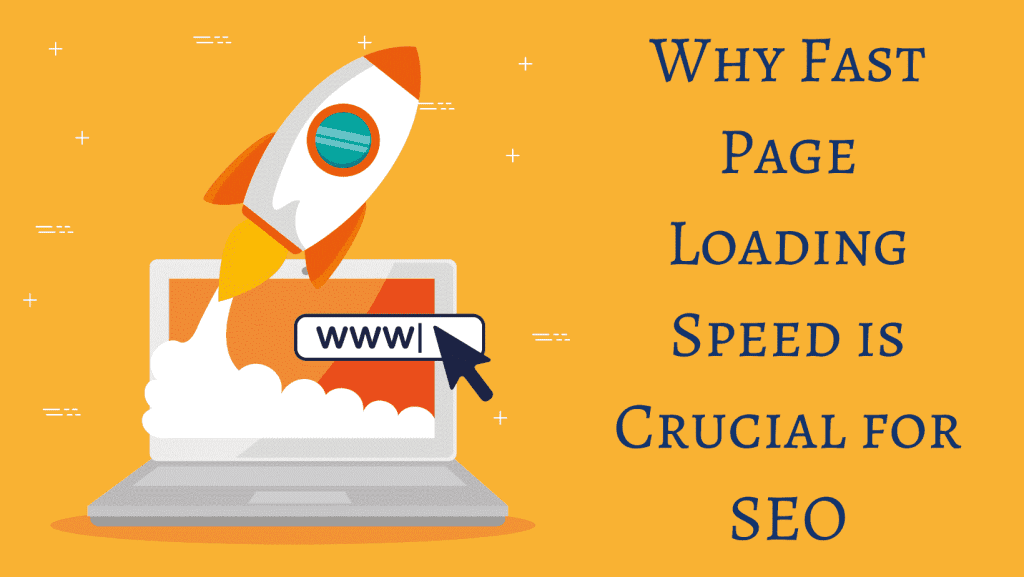In today’s fast-paced digital world, where attention spans are shrinking, first impressions matter more than ever. When it comes to your website, the first impression is often made in a matter of seconds. One of the critical factors that can make or break that impression is your website’s loading speed. We’ll look at the benefits of quick loading speed for SEO (search engine optimization) and the success of your online presence in this blog post.
The Need for Speed:
Before we dive into the SEO aspect, let’s understand why website speed matters in the first place. Picture yourself as a visitor to a website. You click a link, and the page takes forever to load. Frustrating, right? You’re not alone in feeling that way.
Research has shown that:
- 47% of users expect a web page to load in two seconds or less.
- 40% of people abandon a website that takes more than three seconds to load.
These statistics should grab your attention because they directly impact your website’s performance and user engagement. A slow-loading website can lead to higher bounce rates, decreased user satisfaction, and lost opportunities for conversions.
The Google Factor:
As the top search engine in the world, Google strives to give its consumers the greatest search experience possible. That objective includes recognizing and rewarding websites that provide a quick and effective experience. Here, the link between page load time and SEO is made quite evident.
The loading time is taken into account by Google’s ranking formulas. Google stated that they would consider website speed when calculating search rankings in 2010. The explanation is straightforward: Google wants to give users with relevant search results that also offer a satisfying user experience.
How Loading Speed Impacts SEO:
Now that we’ve established the importance of fast loading speed, let’s delve into how it directly influences your website’s SEO:
1. Improved User Experience:
User experience is paramount to SEO success. A fast-loading website keeps visitors engaged and encourages them to explore more pages, reducing your bounce rate. This, in turn, signals to search engines that your content is relevant and valuable.
2. Lower Bounce Rates:
When visitors quickly leave your website because of slow loading times, it sends a negative signal to search engines. They interpret this as a lack of relevance or user satisfaction, which can lead to lower rankings.
3. Better Mobile Experience:
With the growing number of mobile users, Google has implemented mobile-first indexing, meaning it primarily uses the mobile version of a site for ranking and indexing. Fast loading speed is even more critical for mobile users, as slower loading times can result in an unsatisfactory experience.
4. Crawl Budget Optimization:
Search engine bots have a limited amount of time (crawl budget) to crawl and index your website’s pages. A fast-loading site ensures that more pages are crawled during each visit, increasing the chances of your content being indexed promptly.
5. Improved Conversion Rates:
Apart from SEO, fast loading times can also boost your conversion rates. Users are more likely to complete desired actions (e.g., signing up, making a purchase) on a site that loads quickly. Higher conversion rates can indirectly impact your SEO by increasing user engagement and relevance signals.
How to Improve Loading Speed:
Now that you understand why loading speed is crucial for SEO, let’s explore some practical steps to boost your website’s performance:
1. Optimize Images:
Large images can significantly slow down your website. Use image compression tools to reduce their size without sacrificing quality.
2. Minimize HTTP Requests:
Each element on your web page (images, scripts, stylesheets) requires an HTTP request. Minimize these requests by combining files and reducing unnecessary elements.
3. Use Browser Caching:
Leverage browser caching to store static files on a visitor’s device temporarily. This reduces the need to re-download assets on subsequent visits.
4. Enable Gzip Compression:
Gzip compression reduces the size of your web pages, making them load faster. Most web hosting providers offer this feature.
5. Choose a Reliable Hosting Provider:
Your hosting provider plays a crucial role in website speed. Opt for a reputable host that offers fast server response times and adequate resources for your website.
6. Use Content Delivery Networks(CDN):
CDN distribute your website’s content across multiple servers worldwide, reducing the physical distance between your site and users. This results in faster loading times, especially for international visitors.
7. Minimize JavaScript and CSS:
Excessive JavaScript and CSS files can slow down your site. Minimize and optimize these files to improve loading speed.
8. Regularly Update Software:
Ensure your content management system, plugins, and themes are up to date. Updates often include performance improvements.
Measuring Your Website’s Speed:
To gauge your website’s loading speed and identify areas for improvement, you can use tools like Google PageSpeed Insights, GTmetrix, or Pingdom. These tools provide insights into what’s slowing your site down and offer recommendations for optimization.
Conclusion: Speed to Success
In the world of SEO, speed is not just a luxury; it’s a necessity. Your website’s loading speed impacts everything from user experience to search engine rankings. By prioritizing speed optimization, you’re not only pleasing your visitors but also sending positive signals to search engines like Google. So, don’t underestimate the importance of fast loading speed – it’s the turbo boost your website needs to succeed in the digital realm.
